Pet parents want what is best for their companions and often deliberate about what diet to feed them, whether pet insurance is necessary and what behaviours for pets are unusual. Yet how often do they turn to their vets for general advice on these concerns? Our Medical Opinion Leader Vet Panellists share their insights and advice about pet diets, insurance and issues to watch out for that might mean it’s time for a vet visit…
The tell-tail signs it’s time for a vet visit…
Vets have to deal with an endless variety of animal issues, but the most common type of patient they see are pets with general illnesses (48%), with other concerns such as old-age issues (10%) and accident or injury (7%) taking up significantly less of their time.
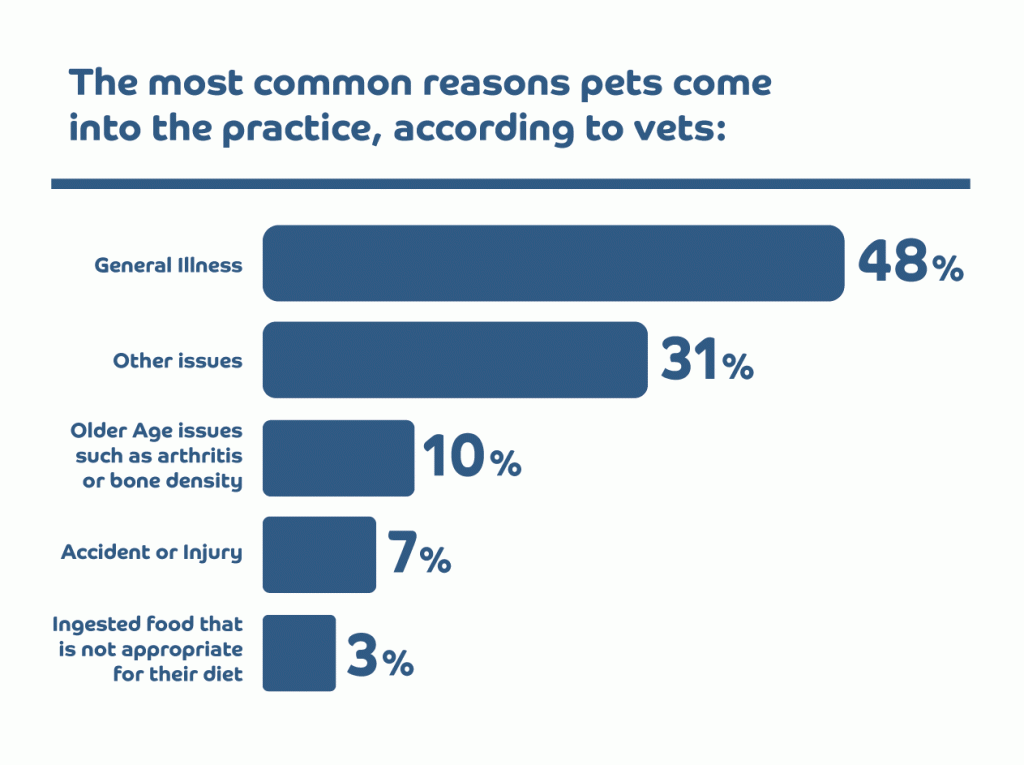
Sometimes when there’s something wrong with our pets it can be really obvious, but often pet parents can be unsure or unaware of problems with their pet’s health. Our panel vets stated that only 14% of patients they see are in the early stage of the ailment when they see them. While the majority of pet parents are bringing in their beloved animals in the mid stage of an issue (41%), around 45% are bringing their pet in with mid-late signs of the ailment.
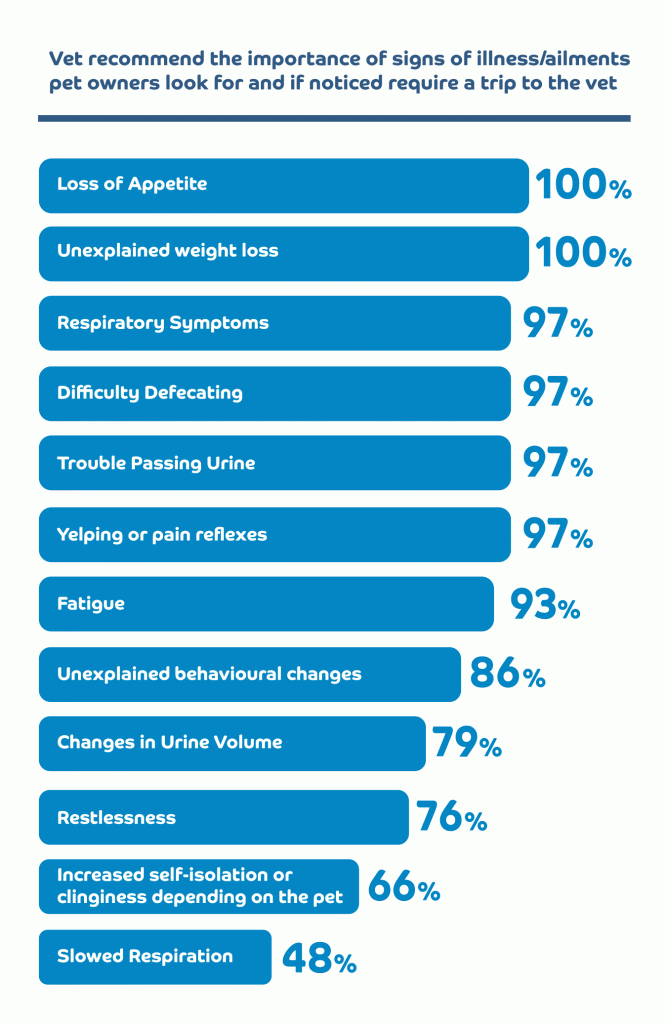
Most of our vets suggested that pet owners might have realised earlier signs of their ailments if they knew what to look for (86%). So what should pet parents be on the look-out for? The most urgent (and probably most obvious) concerns that pet parents should be watchful for are unexplained weight loss and loss of appetite. Most of our panel vets also suggested respiratory symptoms, difficulty defecating or passing urine and yelping or pain reflexes should require a trip to the vet if noticed. Fatigue, unexplained behavioural changes, restlessness are also things suggested for pet owners to watch out for.
Pet Nutrition Is A Vet’s Intuition.
We all love winter comfort food, but many Aussies are probably guilty of treating their beloved animals to some extra hearty foods, something which most of our vets say is not a good thing (73%). Whether it’s scraps from our own food (64% of our vets said feeding pets leftovers from human meals is not at all helpful), or their own specially prepared homecooked pet meals, it may not be as good for our pets as we think…
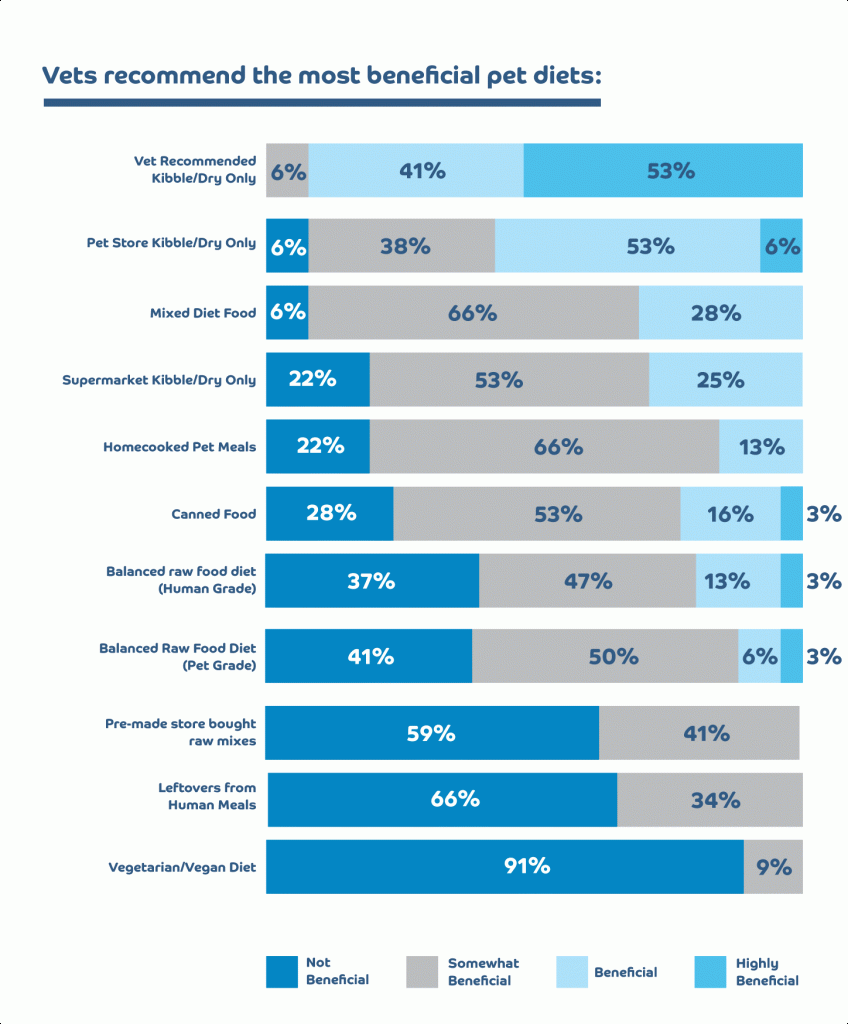
Only 1 in 10 of our vets say that homecooked pet meals are beneficial (11%), with the majority stating they think they are only somewhat so (64%) and a quarter stating that this type of pet food has no benefit (25%). This is because animals require a delicate mix of nutrients that can be hard to replicate using ingredients we would usually use for ourselves.
What does our vet panel recommend for the best singular strategy for how to healthily feed our pets? The almost unanimous answer we received is a vet recommended kibble (rated 9.7 out of 10 as an option). Most quality dry foods have a formulated balance of the ingredients and nutrients for pets, taking the inconsistency and unknowns out of the equation. The next best option our vets suggest is a pet store kibble (rated 8.8 out of 10 as an option), followed by a supermarket-stocked kibble (rated 6.7 out of 10 as an option).
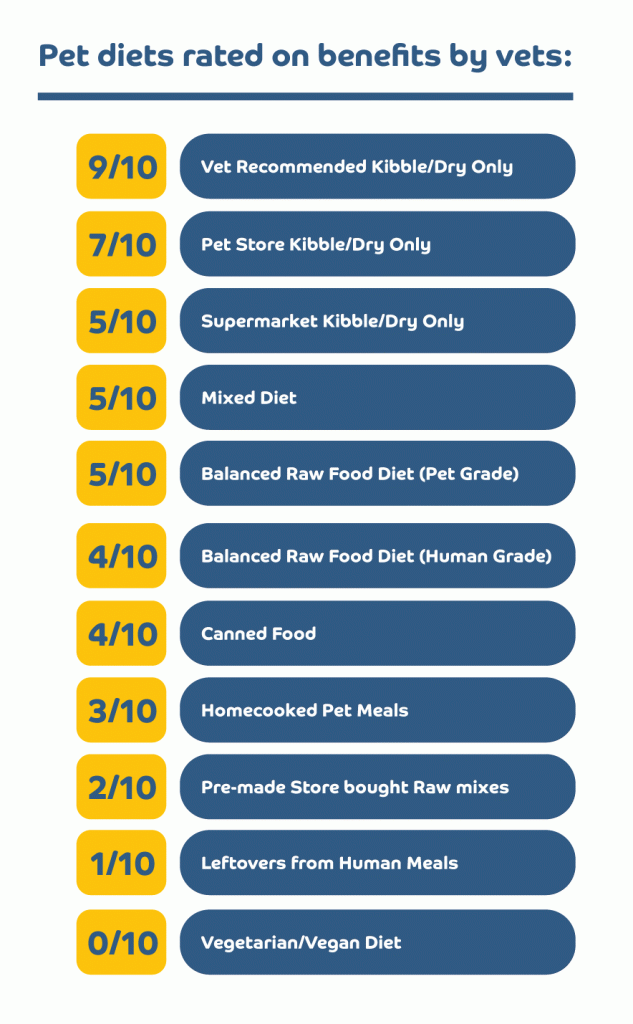
As for specific brands, Royal Canin rated the most popular choice, with 89% of our vets highly recommending this, followed closely by Hills Science Diet (86% highly recommended by our vet panel). The worst performing pet kibbles according to our vet panel are Pedigree, with 36% scoring this a 1 out of 10 recommendation, My Dog (40% rate 1 out of 10) and Lucky Dog as the most poorly recommended of all (53% rate 1 out of 10).
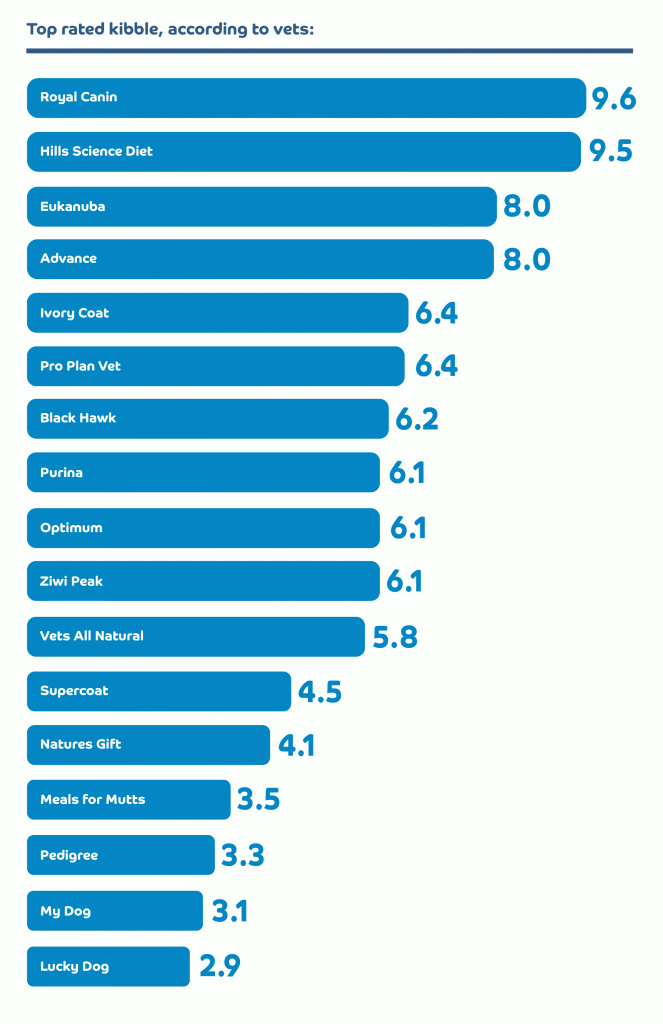
Becoming a Vet Is No Walk In The Park…
It’s easy to compare taking our pet to the vet with taking ourselves to the GP, and sometimes this can end in shock when the vet bill is more than what we were expecting! But when you realise the practicalities of firstly becoming a vet, and then the day-to-day practice of operating as one, it becomes clear that our assumptions are often misplaced.
Of the vets we surveyed, all completed a minimum of 6 years of study, and have been working as practising vets for an average of 19 years. Of course, much like studying medicine, veterinary students must also decide what kind of vet they’d like to specialise as, and there are a lot more options than the general veterinary practitioner that most people associate with the word ‘vet’. Some alternative specialties that vets can find themselves in include; anaesthesia, animal behaviour, dentistry, dermatology, ophthalmology, zoological medicine, veterinary nutrition, or animal welfare. It’s no wonder vet study takes so many years – there is such a variety in simply choosing what kind of vet one wants to become. And that is just the beginning…
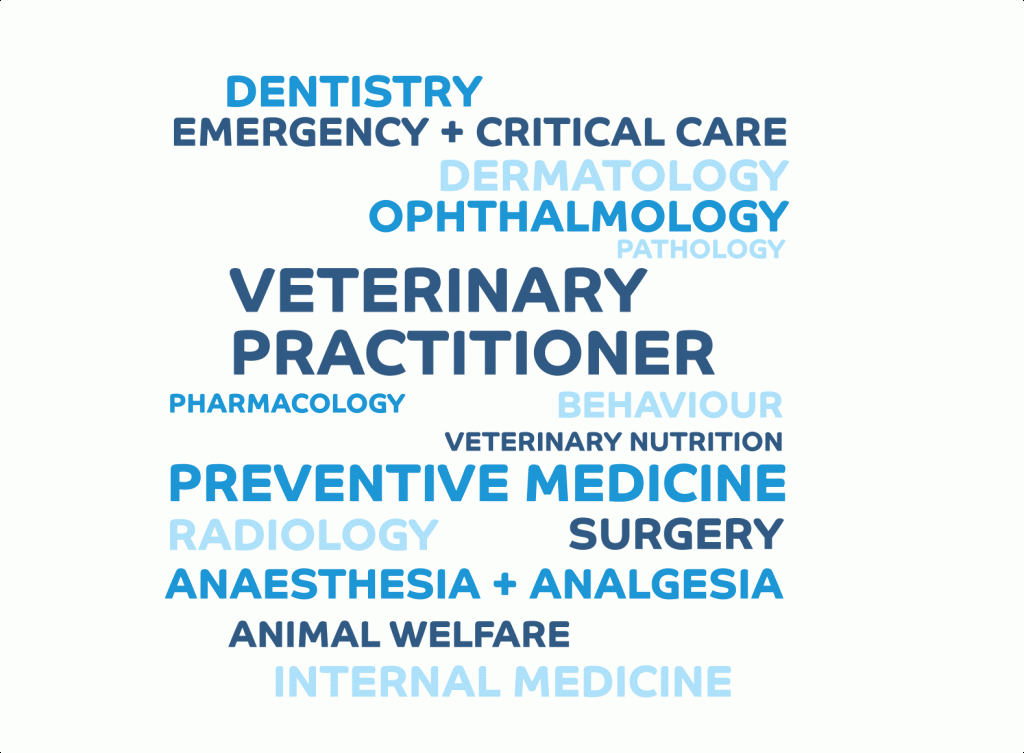
If a Pet Kitty Isn’t Your Thing, Then You Might Need Insurance
For all the reasons we’ve mentioned and more, the costs of running a vet practice and providing effective and compassionate care to animals is high, both financially and mentally for vet practice staff, so it’s no wonder vet bills can be expensive. It’s illogical to compare to our own health bills – there’s so much more to veterinary services than meets the eye, and there’s no Medicare equivalent for our pets.
Therefore, factoring in health costs is vital when considering a pet. If you can’t save a significant amount for just-in-case medical care then pet insurance can be a good option for pet owners. The majority of our surveyed vets believe more pet owners could benefit from pet insurance (86%), and 41% stated that in their experience, money impacts on the pet owners decision to go ahead with treatment most or all of the time.
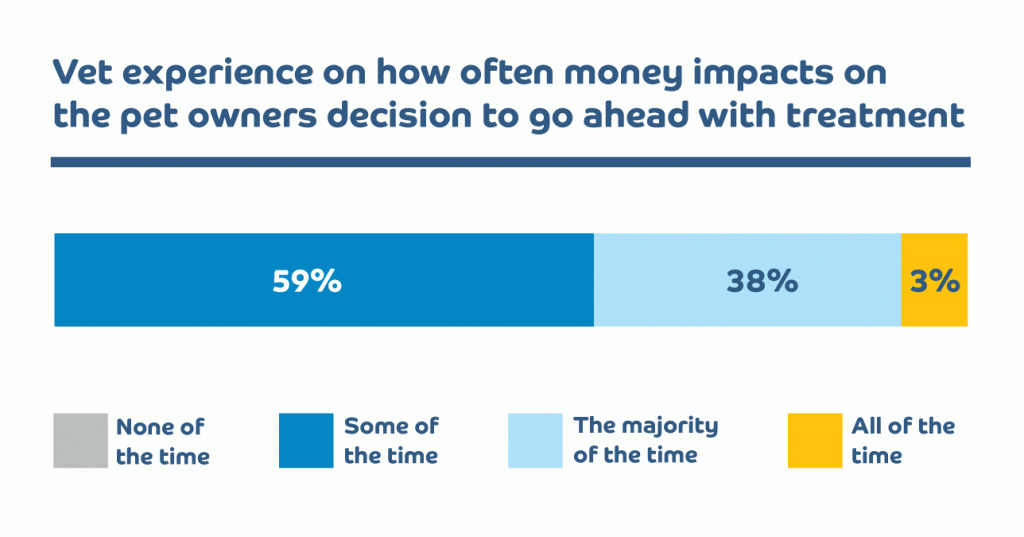
However, the majority of our vets also feel pet insurance should be more affordable (93%), with just over half believing the existing offering is not good value for money (52%). So which insurer would they recommend if they had to choose? The most common suggestion by our vets was RSPCA pet insurance (41% recommended).
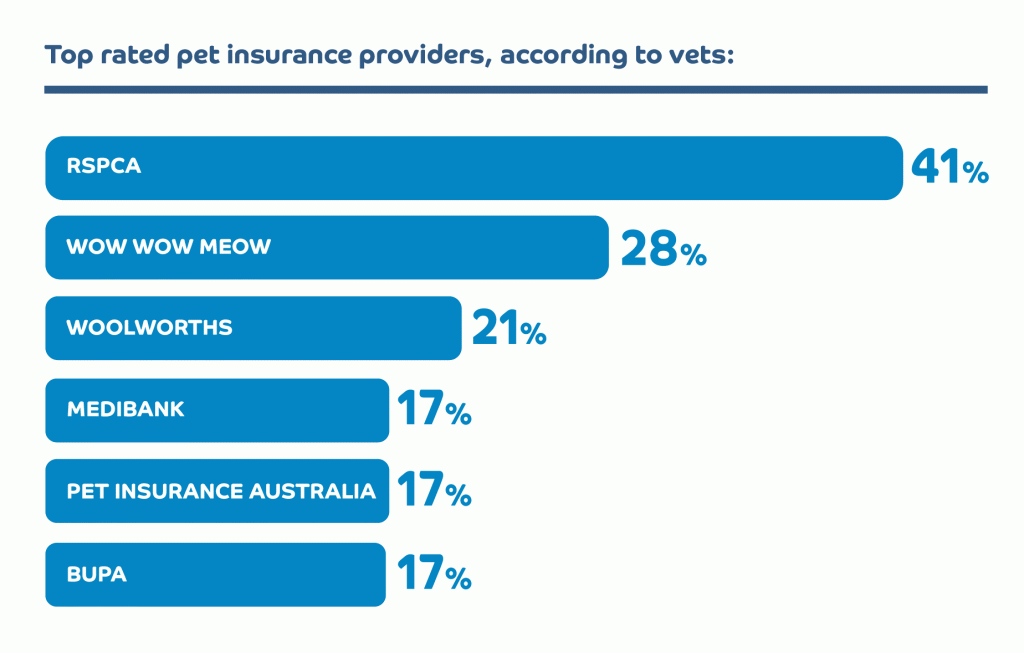
Our vets also think that generally ‘gap only’ payments (provided through some insurers) are an important feature, with 24% stating this as very important, 34% as important and 28% as somewhat important, leaving only 14% of vets believing it is not important at all.
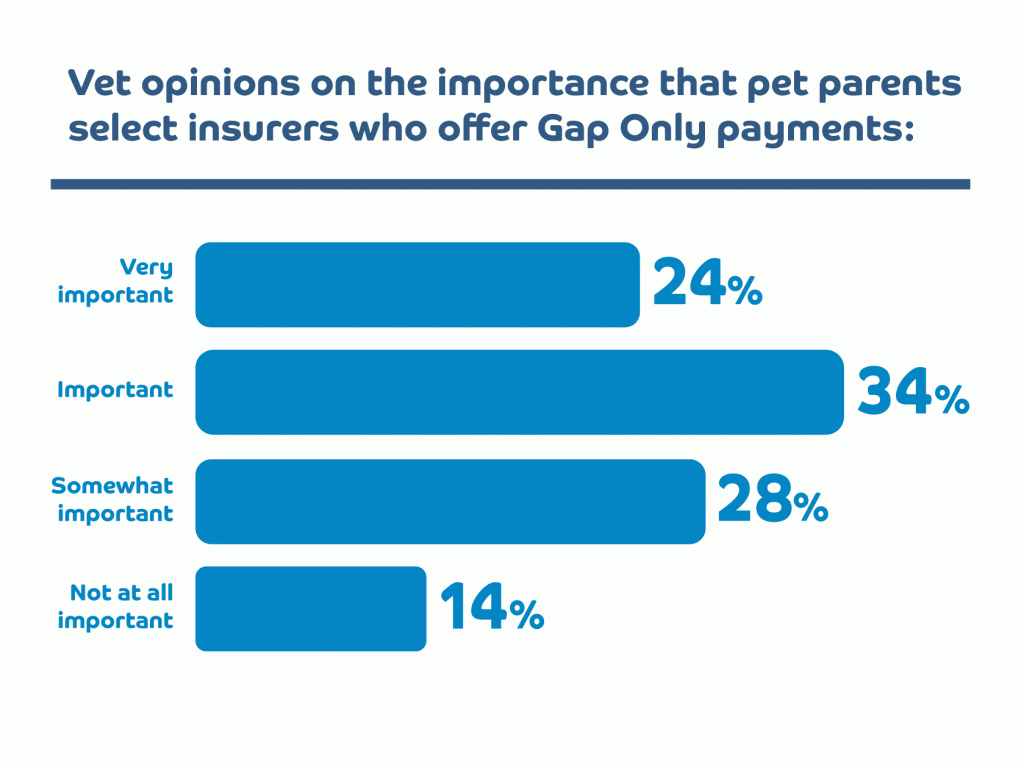
What’s Going On Behind The Scenes…
Australia is currently experiencing a national vet crisis so urgent that the federal government has added veterinarians to Australia’s Priority Migration Skilled Occupation List. The shortfall of available veterinarians that is needed to fill positions, particularly in rural areas, has been in part caused by the increase in pet ownership during 2020 Covid lockdowns. But even before the pandemic increased the demand for pet health services, vets already were facing so many challenges that pet owners may not have considered.
Every single vet on our panel conducts surgeries in their current role, spending on average 29% of their working week in the operating theatre. Within a veterinarian practice, there are often a team of vets and other support staff (our vet panel have an average of 5 vets working within their own practices), and staffing and scheduling alone can take up an enormous amount of energy for small vet businesses. Of our surveyed vets a significant number are also the practice owner (29%) or practice partner (12%) in addition to being a practicing vet, adding the stress of business operations and profitability to their assortment of responsibilities.
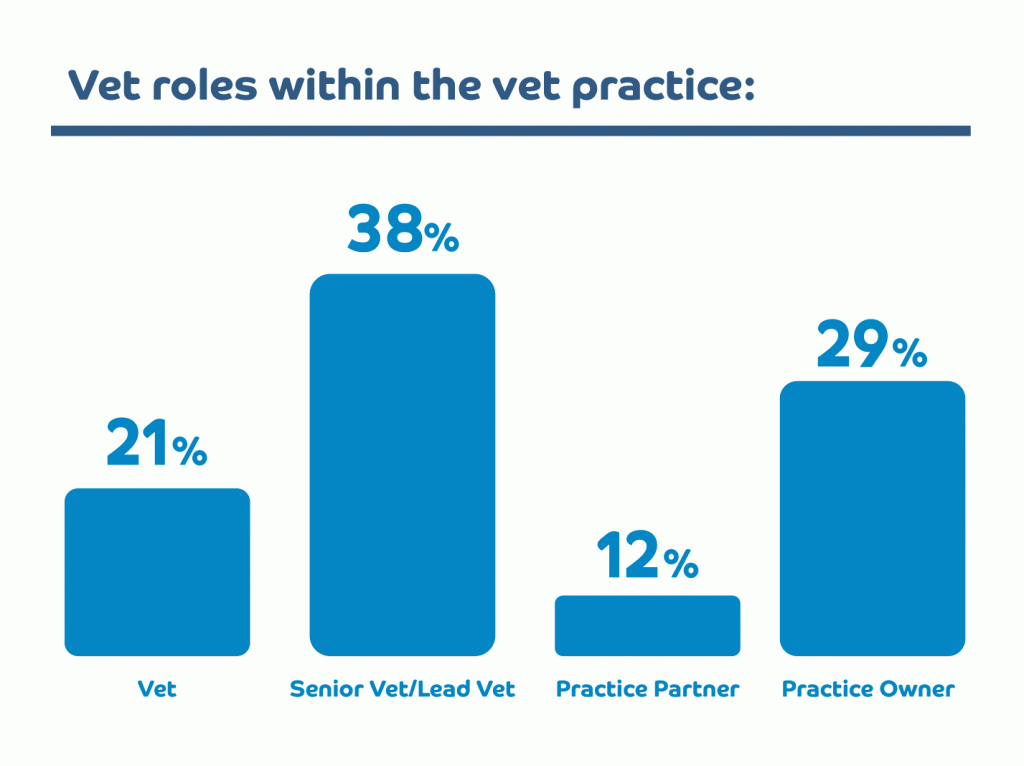
For those that choose to become general veterinarian practitioners there is so much variety in the day-to-day. Not only are vet practices operating as a GP, surgical suite, animal psychologists, dental practice and an emergency department all in one, but they are also juggling all these services across multiple species! And for some, running a business.
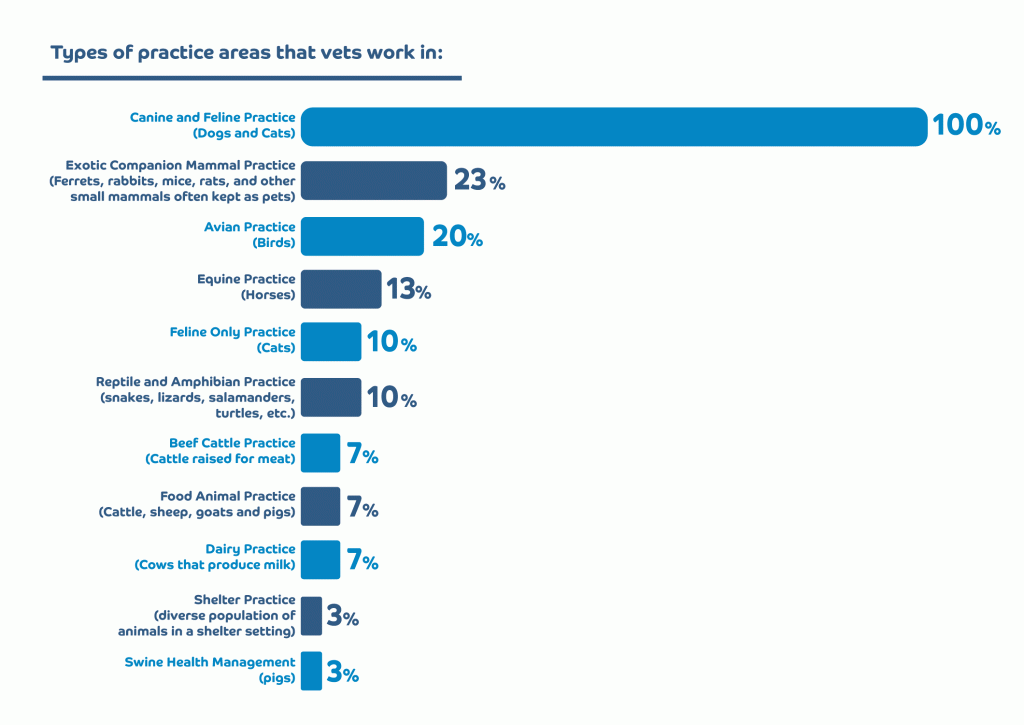
This is certainly a notion we pet-owners have probably taken for granted once or twice. Considering that another key contributor to the current shortfall is due to vets suffering from mental fatigue, we think now is really the time to appreciate our vets for all they do, and to return the compassion and care that they provide for our fur-babies on a daily basis.
Give Your Vet A Pat, On the Back That Is…
It might take some time for the vet industry to recover from it’s current state, and with both animals and human health on the line, it’s up to pet owners to help out where they can. Whether you’re a new pet owner or have years of experience in dealing with pet health concerns, now is the time to be considerate and empathetic to our vets. This might simply be in how we speak to them, being understanding when things can’t be done faster or to our schedules, or even just thanking them for all their hard work. After all they do look after our furry and not-so-furry best friends.
Ekas spoke to 36 Veterinarians on it’s panel Medical Opinion Leaders in May 2021.
